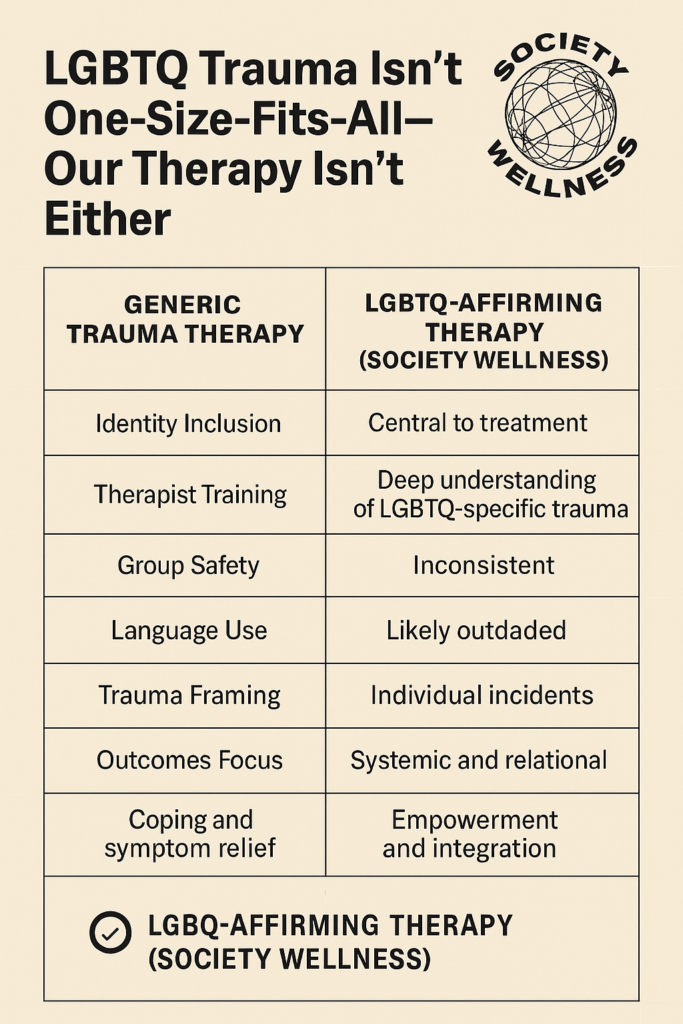Some wounds don’t have a headline moment. No big event. No scar to point to. Just years of not being called by your name. Being told you were “too sensitive.” Laughing along at jokes that made you want to disappear.
If you’re newly sober and feeling deeply alone, it’s not just the alcohol or drugs you’re putting down—it’s the armor. And underneath? There’s often pain that hasn’t had language, especially for LGBTQ people. That’s what trauma does: it hides itself to survive.
At Society Wellness, we meet people exactly there. Not just as “addicts” or “clients,” but as whole humans who’ve survived in ways they weren’t always allowed to name. And that’s why our therapy doesn’t follow a template. Because LGBTQ trauma isn’t one-size-fits-all. Your care shouldn’t be either.
What Is LGBTQ Trauma—and Why Is It So Easy to Overlook?
LGBTQ trauma isn’t always one big thing—it’s often the buildup of small, sharp moments:
- Being taught to hide your identity “for your own good”
- Constantly scanning for danger in public spaces or on dates
- Experiencing rejection from spiritual communities or family
- Navigating a medical or mental health system that doesn’t believe you
This kind of trauma—often called minority stress—doesn’t come from one event. It’s chronic. It’s cumulative. And it can deeply shape how someone relates to safety, trust, intimacy, and even themselves.
Many people in early recovery begin to feel these things for the first time—not because they weren’t happening before, but because substances kept them numbed or distracted from the ache. Once sober, the pain rushes in. And if therapy doesn’t reflect that reality, it can miss the most important part of healing: being seen.
Generic Trauma Therapy: What It Misses for Queer Clients
Most trauma therapy models were built without LGBTQ people in mind. That’s not a criticism—it’s a fact. And while many therapists are well-meaning, when queer-specific experiences aren’t named, they can be unintentionally erased.
Here’s what often happens in standard trauma therapy:
- Misgendering or assumption of pronouns: Even once can break trust.
- Framing family rejection as a personal belief conflict: It’s trauma.
- Minimizing fears about discrimination or safety: They’re not irrational.
- Avoiding identity topics to “focus on the real trauma”: Identity is part of the trauma.
When therapy doesn’t explicitly validate the unique burdens LGBTQ clients carry, it can feel like one more place where you have to “code-switch” or explain yourself just to be heard. That’s exhausting. And retraumatizing.
Affirming Trauma Therapy at Society Wellness: What We Do Differently
We built our model to do more than just include LGBTQ clients. We center them.
That means:
- All staff are trained in LGBTQ trauma and recovery intersections
- Therapy includes identity as part of the healing—not a side note
- Group spaces are actively queer-affirming and trauma-sensitive
- You won’t have to explain the basics of your reality—it’s already respected
We also understand that LGBTQ trauma often shows up with complicated grief, internalized shame, and a long-held belief that healing just isn’t for people like you. So we go slow. We listen carefully. And we invite you into a new kind of safety—one where you don’t have to disappear to get better.
Comparing Approaches: Why Affirming Trauma Therapy Isn’t Just “Extra Support”—It’s Essential
| Feature | Generic Trauma Therapy | LGBTQ-Affirming Therapy (Society Wellness) |
|---|---|---|
| Identity Inclusion | Variable; often limited | Central to treatment model |
| Therapist Training | General trauma education | Deep understanding of LGBTQ-specific trauma |
| Group Safety | Inconsistent; often heteronormative | Structured, actively queer-affirming groups |
| Language Use | Neutral or outdated | Inclusive, precise, evolving with community norms |
| Trauma Framing | Individual incidents | Intersectional, includes systemic and relational trauma |
| Outcomes Focus | Coping and symptom relief | Empowerment, integration, identity-safe recovery |
Affirming trauma therapy isn’t about being “extra careful.” It’s about being accurate. And humane.

Why Early Sobriety Is a Unique Time to Address LGBTQ Trauma
Sobriety removes a buffer. For many LGBTQ folks, substances weren’t just a problem—they were a shield. A way to survive the isolation. Quiet the anxiety. Disappear when the world got too sharp.
When that shield is gone, everything feels louder: memories, shame, disconnection, unmet grief. It’s not weakness. It’s what happens when pain that was buried finally has space to breathe.
This is also a window of incredible opportunity.
Therapy at this stage doesn’t just address what hurt—it helps rebuild what’s been missing:
- A sense of self that includes your full identity
- Boundaries that reflect your values, not survival instincts
- Real community—not just spaces that tolerate you, but ones that hold you
You don’t have to be “all better” to begin this work. You just have to be willing to tell the truth—at your pace, in your language.
You Deserve a Place Where You Don’t Have to Translate Yourself
We say it all the time in session: you shouldn’t have to teach your therapist how to respect you.
You deserve:
- Therapy that names what you’ve lived, without needing you to explain
- Community that knows the loneliness of early sobriety, and still shows up
- Support that sees your queerness not as a sidebar, but a strength
At Society Wellness, we don’t promise quick fixes. But we do promise to meet you with honesty, dignity, and care. Whether you’re feeling raw, guarded, or just unsure where to begin, we’re here.
FAQ: LGBTQ Trauma & Affirming Therapy
What makes LGBTQ trauma different from other kinds of trauma?
LGBTQ trauma often includes chronic, identity-based harm—like rejection, invisibility, and societal discrimination. It’s not just about what happened, but who it happened to, and how that shaped your ability to feel safe in the world.
I’ve had bad experiences in therapy before. How is this different?
We get it. Many LGBTQ clients come to us disillusioned. What’s different here is that we build every part of our program with you in mind—from pronoun use to group therapy dynamics to the way we talk about healing. You won’t have to fight to be seen.
Can I work on trauma if I’m still figuring out my identity?
Absolutely. Your therapy isn’t dependent on having everything “figured out.” We welcome people at all stages of identity exploration. There’s room for your questions, contradictions, and evolving truth.
Do I have to be sober to start trauma therapy?
While sobriety creates a safer foundation for trauma work, we meet you where you are. If you’re still working toward sobriety, we can help stabilize your recovery and prepare for deeper healing at a pace that makes sense for you.
Ready to Talk With Someone Who Gets It?
📞 Call Society Wellness at (888) 964-8116. Whether you’re newly sober, carrying unspoken pain, or just curious about what healing could look like when it includes your whole self—we’re ready when you are.

